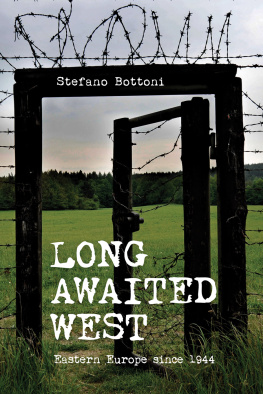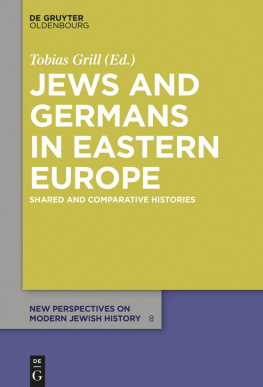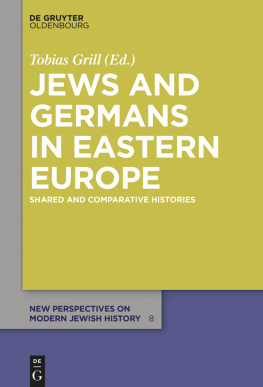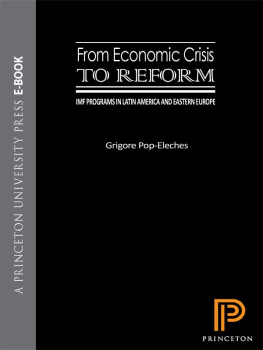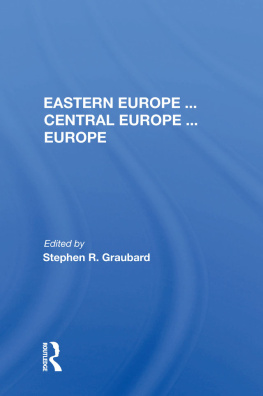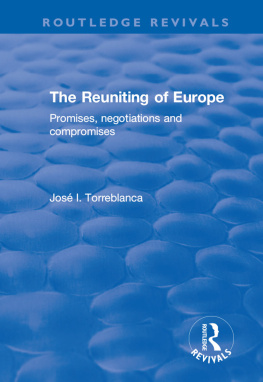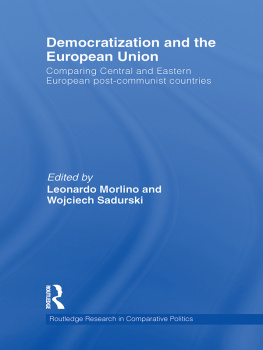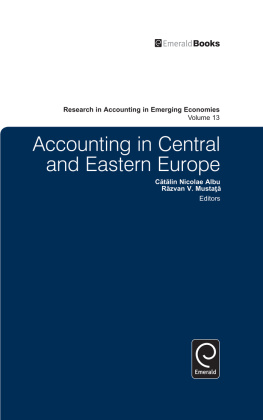

LONG
AWAITED
WEST

LONG
AWAITED
WEST
Eastern Europe since 1944

STEFANO BOTTONI
Translated by SEAN LAMBERT
INDIANA UNIVERSITY PRESS
This book is a publication of
Indiana University Press
Office of Scholarly Publishing
Herman B Wells Library 350
1320 East 10th Street
Bloomington, Indiana 47405 USA
iupress.indiana.edu
2017 by Research Centre for the Humanities, Hungarian Academy of Sciences
This book was produced under the auspices of the Research Centre for the Humanities of the Hungarian Academy of Sciences and with the support of the National Bank of Hungary.
All rights reserved
No part of this book may be reproduced or utilized in any form or by any means, electronic or mechanical, including photocopying and recording, or by any information storage and retrieval system, without permission in writing from the publisher. The Association of American University Presses Resolution on Permissions constitutes the only exception to this prohibition.
The paper used in this publication meets the minimum requirements of the American National Standard for Information SciencesPermanence of Paper for Printed Library Materials, ANSI Z39.48-1992.
Manufactured in the United States of America
Names: Bottoni, Stefano, author.
Title: Long awaited West : Eastern Europe since 1944 / Stefano Bottoni ; translated by Sean Lambert.
Other titles: Vrva vrt Nyugat. English
Description: Bloomington : Indiana University Press, 2017. | Includes bibliographical references and index.
Identifiers: LCCN 2017001600 (print) | LCCN 2017031128 (ebook) | ISBN 9780253030207 (eb) | ISBN 9780253026958 (cloth : alkaline paper) | ISBN 9780253030016 (paperback : alkaline paper)
Subjects: LCSH: Europe, EasternHistory1945 | Europe, EasternEconomic policy. | Europe, EasternSocial policy. | Europe, EasternRelationsEurope, Western. | Europe, WesternRelationsEurope, Eastern.
Classification: LCC DJK50 (ebook) | LCC DJK50 .B68813 2017 (print) |DDC 947.0009/045dc23
LC record available at https://lccn.loc.gov/2017001600
1 2 3 4 522 21 20 19 18 17
To my family, with love
CONTENTS
ACKNOWLEDGMENTS
H ABENT FATA SUA LIBELLI. The seminal idea of this book originates from the bold proposal an Italian editor made to me, a fresh PhD with a limited conceptual horizon, around ten years ago. Although I was relieved after declining this offer to write nothing less than a general history of contemporary Eastern Europe, I had to admit to myself that it would be wonderful if a celebrated scholar were to produce such a work. To my greatest surprise, in 2009 another editor made me a tempting offer on a similar issue. I accepted it with a pinch of rational skepticism and spent the following year reflecting on how to narrate the recent past of this region to an academic and nonacademic audience. The result of that effort was a book published in 2011 by Carocci Editore in Rome (Un altro Novecento: LEuropa orientale dal 1919 ad oggi), which soon became a popular college textbook in my home country. A deeply revised, chronologically more concentrated version of that book came out three years later under the auspices of my new academic base, the Hungarian Academy of Sciences in Budapest. Shortly after, I was offered the privilege to make it accessible to the international public by a leading scholarly publisher, Indiana University Press. As a result of a hard year of work that included not only the translation but also the narrative and conceptual reframing of the previous manuscripts, the reader finds here a new self-standing book, and not a mere revision of the previous editions. I have adapted the narrative style and reduced the amount of details and background information to the needs of an international public of area scholars and students interested in getting sense of the somber, often controversial, and indeed very fascinating history of the people of Eastern Europe since the end of the Second World War.
Because of the unconventionally complex genesis of this book, the list of persons and institutions to whom and which I owe my deepest expressions of gratitude is unbearably long. Thus, I will mention only those who contributed to the making of this most recent manuscript, while I also extend my gratitude to the multitude of scholars, colleagues, and students with whom I have discussed the topics covered in this book over the past decade. My first thanks are addressed to the general director of my workplace, the Research Center for the Humanities: Pl Fodor has placed great belief in this project, providing me with the financial resources needed for translating the Hungarian edition. My colleague Lszl Borhi has played an invaluable role in making possible the advancement of the process. A special thanks to Sean Lambert, my translator, who has also been a valuable intellectual partner and a patient critic during the laborious stages of developing a new manuscript. I am deeply indebted to the colleagues with whom I had the privilege to spend an unforgettable period of research at the Imre Kertsz Kolleg of the University of Jena in 2015. Among the many people whose enthusiasm and competence made my stay in Jena so productive and pleasant, I would like to address my sincere thanks to professors Joachim von Puttkamer and Wodzimierz Borodziej and to the colleagues who participated in this intellectual journey with me. Although this book project was not originally linked to my stay in Jena, I am certain that they will find some of the seminars we attended and the lengthy conversations we carried out on world affairs reflected in the pages to follow. I also wish to express my gratitude to those who have read and made insightful comments on the manuscript or parts of it: Ferenc Lacz, Tom Junes, Valentina Fava, Guido Franzinetti, and Zoltn Pogtsa. Last but not least, I would like to thank the editorial staff of Indiana University Press for handling the publication process with professionalism and the optimal amount of flexibility. I take full responsibility for any errors or omissions that may have remained in the book, notwithstanding the contribution of so many benevolent colleagues to improve the final version of the manuscript.

LONG
AWAITED
WEST
Introduction
Reframing the Debated Concept of Eastern Europe
W HEN WAS THE CONCEPT of Eastern Europe born, which territories of Europe were meant to be included in it, and what has remained of it after the end of the Cold War? The meaning of Eastern Europe has been changing continuously. Each scholarly community and political group interprets this expression differently. This might not be surprising, since the term is related to questions of (self-)legitimization and emotions more than to scholarly considerations. As any nonEastern European historian who deals with Eastern Europe may have already experienced, the difficulty regarding this term tends to arise when Eastern European colleagues reject the notion on the ground that it is unsuitable to describe their homeland (though are willing to admit that it might perhaps be meaningfully applied to neighboring countries). While the concept of Eastern Europe is viewed in the West as corresponding to a self-evident reality, many Eastern Europeans consider it little more than a historical and moral stigma. This serves to explain the paradox that whereas in the West many distinguished universities offer an area studies program focused on Eastern Europe, thereby recognizing the legitimacy of regional approaches, in the states of the former Soviet Bloc, consciousness of the shared trajectory of Eastern Europe from 1944 to 1989 is gradually fading.
Next page
